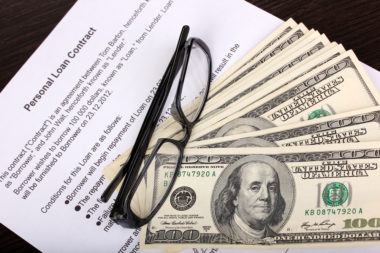For those who aren’t financially stable, it’s beneficial to have a cosigner to obtain a loan. If you cosign on a loan, it’s important to understand that your personal financial status could be at risk, especially if the borrower defaults on that loan. Learn more about what it means to cosign on a loan, the reasons someone might do so, and the risks associated with cosigning.
Table of Contents
What Is a Cosigner?
To cosign on a loan means to agree to the terms and conditions of a loan cooperatively with the borrower. Often, a cosigner helps a borrower obtain a loan they would otherwise be ineligible for due to their personal financial status.
The most common loans people cosign for are personal, auto, student, and mortgage loans. It’s important to understand that while a cosigner helps the borrower get a loan, the cosigner does not receive any principal from the loan and is not responsible for monthly payments — unless the borrower defaults on the loan.
Why Are Cosigners Important?
Lenders want to provide loans to individuals with good credit. If someone’s credit score is less than average, it can be difficult to obtain a loan. A cosigner with a good history of paying bills on time is much more attractive to lenders. Cosigners are also helpful for people who have yet to establish good credit. For instance, if you’re looking to rent an apartment but have no credit history, you may need a cosigner. The same can be said with many other big items or experiences, like a car or higher education.
Reasons for Cosigning a Loan
There are a number of reasons why someone may need a cosigner. For instance, if someone has poor credit, having a cosigner makes them a more appealing applicant for a loan. Cosigners help provides credit, as both people are equally responsible for the loan, helping those with bad credit obtain things like reliable transportation or a home in a safe community.
Someone without any credit history at all may need a cosigner if they intend to purchase a big-ticket item. As a cosigner, you’re giving the borrower the opportunity to establish good credit through on-time payments. Furthermore, your agreement to cosign could make a huge, lifelong difference by granting the individual a chance to attend college, purchase a car, or start a business.
Cosigner Responsibilities and Risks
Cosigning for a loan is not just the act of putting your signature on a line. Your finances are at stake. For the cosigner, the risks of cosigning a loan greatly outweigh the benefits. Understand what a cosigner is responsible for and the risks of cosigning on a loan before you do so.
Full Responsibility for the Loan
If the borrower defaults on a payment, it is your responsibility to pay for it. If the borrower continues to not pay for it, then your financial life is ultimately on the line. Cosigners are responsible for the entirety of the loan. The borrower may have the intention of repaying their loan, but in the event of their defaulting on the loan or a tragedy that results in their death, the cosigner is responsible for the remaining payments on the loan.
Impact on Your Credit Score
Cosigning a loan could damage your own credit. The person who agrees to be a cosigner agrees to incur any debt that the primary borrower goes into. Despite the loan being for someone else, it still appears on the cosigner’s credit score. That means any late or missed payments appear on the cosigner’s credit score, too. As a cosigner, if you have strong credit and the borrower is unable or unwilling to make payments on their loan, your credit score suffers.
Your Access to Credit May Be Affected
If you need to take out a loan but are currently a cosigner for someone else, your chances of being approved for your own loan may dwindle. Lenders will analyze your financial status and credit history, taking note of the loans you are a cosigner on. Armed with the information that you are responsible for another loan, they may be more inclined to reject your application.
Your Relationship May Be Affected
If the person you cosigned for is defaulting on their payments, leaving you to make payments, a level of trust may be lost in the relationship. Before you agree to cosign, make sure you can trust the person you’re cosigning for. Express any concerns that you have about them not being able to make payments, and assess your personal financial status, too. Doing so will give you a better idea of what your budget will look like if the borrower does default on their loan payments.
How to Protect Yourself if You Cosign a Loan
If you have to cosign for someone — say you’re a parent cosigning for their child’s first car or a student loan from a private lender — there are ways you can protect yourself. Ask the lender what you’ll be responsible for as a cosigner, as well as how you’ll be notified if the borrower misses any payments. Make sure you have access to the loan account or request that you be made the primary account holder so that you’re aware of updates as they occur.
Having collateral against the borrower is another way to protect yourself as a cosigner. For example, if you’re cosigning a loan for a vehicle, keep an extra set of keys handy and explain that you’ll take the car away if the borrower doesn’t make their payments in full and on time.
Yet another way to protect yourself as a cosigner is to take out a life insurance policy on the borrower. It can be difficult to think about, but in the event that the borrower passes away, you are left with their remaining debt. A life insurance policy could help cover the costs of the loan you cosigned on.
Ultimately, cosigning on a loan is risky, but it’s beneficial for helping friends and loved ones establish good credit. Before you cosign, make sure you assess the responsibilities and risks.
Image Source: https://depositphotos.com/





